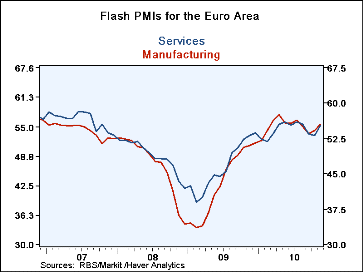 Global| Nov 23 2010
Global| Nov 23 2010Flash PMIs for EMU Unexpected Recovery
Summary
The FLASH PMI measures for Services and Manufacturing in EMU outran expectations in November. Not only did they not fall as had been expected, but their increases were outsized. The Services index advanced from 53.35 to 55.20 making [...]
 The FLASH PMI measures for Services and Manufacturing in EMU outran expectations in November. Not only did they not fall as had been expected, but their increases were outsized.
The FLASH PMI measures for Services and Manufacturing in EMU outran expectations in November. Not only did they not fall as had been expected, but their increases were outsized.
The Services index advanced from 53.35 to 55.20 making it the eighth highest month-to-month jump in its history of 148 monthly changes. This rise ranks as a roughly top-five-percent event.
For manufacturing the surprise was on the upside as well as the index rose to 55.51 from 54.60 in the previous month. Again, the monthly gain was substantial marking the 14th largest monthly rise in the somewhat longer history of the MFG index, a top 10% event.
Both of these readings surpassed expectations and followed on the heels of the more optimistic Belgian National Bank Survey of Consumers released yesterday. In that same regard, the EU Commission released a reading for consumer confidence in the EU area showing that index rose to a more substantial -9.5 from -10.9. The EU Commission undoubtedly was interested in outing some good news as the Zone was being clobbered in the aftermath of a pending Ireland bailout that has failed to reassure markets about other EU members with debt issues and has destabilized the Irish governing coalition. Yes, it is another great bail-out.
On balance the question is whether economic data can save Europe or if politics will sink it. We have two powerful forces in opposition. We also have a strong background current and the economies in Europe are swimming upstream against it. That current is, of course, ongoing European austerity. While the bail outs are meant to diminish the impact of what would otherwise be harsh medicine from the markets. The impact of the bailout and of previously launched polices by some of the stronger e-Zone economies is that there is no stimulus in the pipeline but fiscal drag. Germany has implemented austerity as has the UK, Italy, Spain and Portugal, not to forget Greece.
As we ponder the outlook for Europe the surge in growth is an unexpected event. While it is ‘encouraging’ it is not something to get carried away with. Even with this ‘pop’ in November the three month averages for the MFG and Services PMIs continue to reside below their respective 6-month and 12-month averages. It is hard therefore to know if the pop this month is the result of some true resurgence or just a swoon that came a little too soon but will continue to be in force as austerity continues to bite and politics continue to sour. More than reassuring, this month’s economic data for Europe tend to stir up the turbidity and cloud the outlook for the future especially in regard to current events which are unraveling faster than the good news is reassuring. The early release of the rising confidence indicator by the EU Commission looks more like a desperate move to put a good face on something that does not deserve it. Still, Italy’s consumer confidence measure rose and the Belgian survey was higher so there is something that is improved that authentically is in gear we just don’t know how lasting it will be. Skepticism is warranted.
Robert Brusca
AuthorMore in Author Profile »Robert A. Brusca is Chief Economist of Fact and Opinion Economics, a consulting firm he founded in Manhattan. He has been an economist on Wall Street for over 25 years. He has visited central banking and large institutional clients in over 30 countries in his career as an economist. Mr. Brusca was a Divisional Research Chief at the Federal Reserve Bank of NY (Chief of the International Financial markets Division), a Fed Watcher at Irving Trust and Chief Economist at Nikko Securities International. He is widely quoted and appears in various media. Mr. Brusca holds an MA and Ph.D. in economics from Michigan State University and a BA in Economics from the University of Michigan. His research pursues his strong interests in non aligned policy economics as well as international economics. FAO Economics’ research targets investors to assist them in making better investment decisions in stocks, bonds and in a variety of international assets. The company does not manage money and has no conflicts in giving economic advice.
More Economy in Brief
 Global| Feb 05 2026
Global| Feb 05 2026Charts of the Week: Balanced Policy, Resilient Data and AI Narratives
by:Andrew Cates






